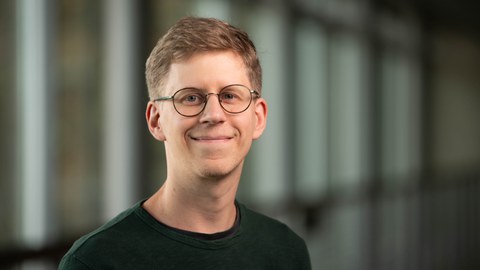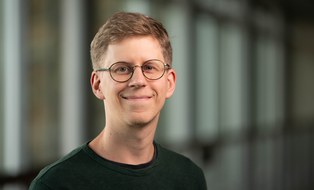Oct 20, 2025
Profiles of new appointees - Prof. Ferdinand Maiwald

Prof. Dr. Ferdinand Maiwald
Prof. Ferdinand Maiwald has held the Chair of Optical 3D Measurement at the Faculty of Environmental Sciences since the summer semester 2024. To satisfy curiosity about his new colleague, he answers a few brief questions. In the following, Prof. Maiwald provides insights into his work in research and teaching.
What are your core research areas?
Measurements are carried out in many disciplines in science and when it comes to 3D geometries, we can provide support as a Chair. For example, we measure very large structures such as the Dresden television tower and how it has changed over the decades. But our measurement methods can also be used for small structures such as components in industrial metrology. There are already several collaborations within TU Dresden, including with the Chair of Railways (Prof. Liu), the LASR Lab (Prof. Calandra) and the Chair of Construction Management (Prof. Otto). We usually use optical sensors such as cameras, laser scanners, laser trackers or total stations for our measurements. In our research, we are currently focusing on the creation of three-dimensional models of our environment, known as digital twins. In particular, we are trying to create global digital urban twins using the data available for each country. In order to document the changes in the digital twins, we also include historical data. We are supported in this by methods from photogrammetry, computer vision and the use of artificial intelligence (AI).
What is your vision for the Chair?
I try to focus on interdisciplinary research and teaching, as this often offers potential for innovation. I would also like to establish new measurement methods in disciplines that have previously had less contact with optical measurement technology. As part of our doctoral projects, we are developing systems that carry out underwater measurements, mobile measurement platforms in the forestry sector, 3D measurement systems in operating theaters and testing the use of augmented reality in industrial measurement. I also see great potential for the use of optical 3D measurement methods in the digitalization and analysis of our cultural heritage. In the future, data management of the increasing amount of recorded data in multi-sensor systems will also have to be mastered, and I am convinced that AI can help with automation. In terms of teaching, the students told me and my team right at the start that there are currently not enough practical courses planned. We responded to this and adapted the course content, because geodesy thrives on experience and practical elements.
Where did you last teach/research/live?
I have lived in Dresden since my studies and was then able to start my doctorate with Prof. Hans-Gerd Maas in a BMBF junior research group in 2016. In 2020, in addition to my work at TU Dresden, I started at the Chair of Digital Humanities at Friedrich Schiller University Jena under Prof. Sander Münster. Due to the corona period, many events and arrangements took place digitally and only partly on site in Jena, which is why my family and I fortunately did not have to move. At the Chair of Digital Humanities, I was able to lead the focus on 3D and 4D modeling as a post-doc, while at the same time I was working on research projects on deformation analysis of wood and concrete objects at the Chair of Photogrammetry at TU Dresden. All in all, this was ideal preparation for my current activities and my field of research.
What was your doctoral thesis topic?
The topic of my doctorate was "A window to the past through modern urban environments - Developing a photogrammetric workflow for the orientation parameter estimation of historical images". To summarize, I filtered historical terrestrial image data from the Deutsche Fotothek using AI. I then developed a process that automatically assigns views of buildings to the correct location in the city. This resulted in our visualization tool, the 4D browser, in cooperation with the junior research group: Link to the 4D browser.
What was your best experience during your studies?
This moment came right at the beginning of my studies. I had been thinking about studying a different subject for a long time before I started studying geodesy. And when I started my studies, I was quickly convinced that I had made the right decision after all. I particularly enjoyed working outside in the field, which sets the geodesy degree program apart from other courses.
What was your worst experience during your studies?
A student night went on a little longer and I had an accident on the way home. I knocked out a tooth. I went to the dentist the next morning, but I was under time pressure because I had to go to a practical exercise on campus. And so I ended up attending the surveying exercise with a knocked-out tooth. The lecturer didn't let on.
When did you know: "I want to become a professor!"?
For a long time, it was the doctoral thesis that was very important to me and the scientific focus on a very specific topic. A primary school teacher had already predicted this goal to my parents. I always kept the option of switching from academia to industry open and even applied for jobs outside of academia a few times. However, I am all the happier that the opportunity with the Chair opened up and that I was offered the chance at TU Dresden. I am very grateful for that.
What is always on your desk?
There's actually always a coffee cup from 2016, which is still from my studies. Fortunately, it's quite big, so it holds a lot of coffee at once.
What positively surprised you about the TU Dresden campus?
I started studying at the TU in 2011, so I've known the campus for a very long time. Even back then, I was fascinated by how the combination of historical buildings and modernity harmonizes. The main campus has its own charm, which is what makes it so special to me. And I am still surprised at how much there is to discover on campus.
What are your favorites?
I think the Großer Garten is a highlight of the city because it's so big and yet close to the center. I also like being in Pieschen, where my family and I have lived for a few years. The area around Konkordienplatz has its very own charm and neighborhood character and the Sankt Pieschen district festival is a must-attend event for us.
Many thanks to Prof. Maiwald for the insights.
 © Sven Ellger
© Sven Ellger
Professor
NameMr Prof. Dr.-Ing. Ferdinand Maiwald
Send encrypted email via the SecureMail portal (for TUD external users only).
